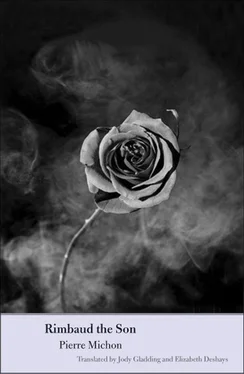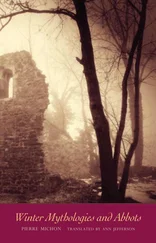The flowers and little smiles she ripped to shreds, like everything else: because she did not love this son who was her, because she did not love herself, who knows? because all she loved in herself was the bottomless well in which everything foundered; and she was too busy feeling her way along the dark walls of that well, groping for the bottom, to notice the small flowers that grew on the coping. More potent offerings were needed. And the son, having always known that the bouquets and simpering smiles, the neat tie, clean trousers, the air of the little gentleman, all filial artifices reminiscent of Victor Hugo were not sufficient, did not work, were rejected, fell into the well, crushed between two dark fingers, her son had found a solution equal to her own, and fashioned for that incommensurable grief incommensurable little gifts — paternosters of his own invention: long passages of rhymed language that she did not understand, but as she pored over them perhaps without being able to read them she saw something disproportionate as her well and unrelenting as her fingers, the mark of a ravaging passion that has forgotten its cause and overshot its effect, of pure, ineffectual love; churchlike things wrapped up in lugubrious finales, smacking of the boot and the dungeon; wooden language out of which he made her a gift box; Latin diatribes on Jugurtha and Hercules, dead captains of the dead language; and in those diatribes no doubt there were flights of doves, June mornings and trumpets, but it all fell onto the page in an opaque idiom of pure December, arranged calligraphically as verses are, that is to say, between two margins a sheer, narrow well of ink, to the bottom of which you drop, page after page. And before all that perhaps she exulted, wordlessly; she recognized herself, and in the Charleville dining room the seated child who looked up at her saw her gaping for a moment, as if astonished, respectful, envious, the fingers in her ceasing to crush the dark and the source of curse drying up, growing calm, as if in this wooden language that she could not read she sensed the work of a well digger more powerful than she was, who dug more deeply and more irremediably, who was her master and in some way her savior. It could be that she caressed his head then. Because it was a gift, in a sense. And when at other times the child read aloud before her the final draft of his Virgilian verses honed to their most true for the local competition, as we can imagine he often did, just as the girls at Saint-Cyr did for the king, and she, the country girl, seated like the king, flabbergasted but reticent, disdainful, royal, which is to say merciless, when thus he went before her with his most high paternosters, he, too, royal, impassioned, admirable and ridiculous like the little Bonaparte at Brienne, vaguely terrifying like him, we can imagine that they were closer at that time than they would have thought possible; but very far apart, both of them on their thrones and not wanting to come down, in the way of two sovereigns of distant capitals who are in correspondence. So in his early years he spoke his poetry and she listened, I am sure. They gave each other this gift, as others offer bouquets and are then embraced by their mothers, under the smiling gaze of their fathers; and the father was there as well, they could hear the lost bugle in the wooden language. Yes, those two incommensurables face to face in Charleville dining rooms crossed swords with one another, gave each other a kind of love: did so by means of language suspended in the air and rhythmical. But while the language conducted its sabbath high above the dining-room light, they themselves, their bodies here below, seated, or standing and reciting leaning against the table, their bodies sulked.
And that too has no doubt been said, because with regard to that childish pout before the photographer, and with regard to Vitalie Rimbaud’s pout which is not known because no photographer captured it once and for all under his black hood, everything has been said. And nearly everything has been said as well with regard to the other one who must not have been very much fun either, the shade who attended those verbal jousts in the dining room in absentia, the Captain, of whom for now we have no photograph either, and yet sometimes we have no doubt that he posed in Purgatory before a camera, among some noncommissioned officers in distant garrisons, smoothing his imperial beard with two fingers or playing cards or with his hand on his sword — and maybe at the precise moment when he remembered young Arthur. He remembers Arthur in a garret in the Ardennes, in yellowed sepia; it is a hundred years since anyone has seen him, behind him a bugle sounds, we do not hear it. The devout will find this portrait some day, you will muse over it, you will see the hand on the hilt or smoothing the moustache, you will not know what he was thinking. But for the moment you do not know this face.
On the other hand, we know the faces of the child’s other relatives because there are photographs of them, and before photographs, painted portraits, from the age when only the hand of the painter tampered with time, using pigments from the earth, not yet the silver chlorides in the box of tricks under the black hood. Because as we know, other ancestors engendered him, remained close to him, not only in photographs, and they were as much at his beck and call as the mother was intractable, and less phantoms on the whole than the father, more flagrant, better vouched for by the thick books with their names on them than the father with his Bescherelle grammar book, abandoned in Charleville in the haste of his departure, which was also thick, it is true, but the trace of the father in the margins, learned annotations in spidery scrawl, was infinitesimal; and the grammar book did not bear the name of Rimbaud printed on it, but the name of the Bescherelle brothers. Yes, pure of any kinship with the Captain and the Captain’s wife, and perhaps also contingent with regard to them as the seven distant planets are with regard to the moon and the sun, the grandfathers appeared magisterially, the beacons as they were called, distant stars in the darkness of schools, Malherbe and Racine, Hugo, Baudelaire and little Banville; who, one arising from the next, had begotten one another in approximately that order, had launched the canonical filiation that heats up the twelve feet two by two, all come from there, all strung along the great twelve-foot rod like brilliant diverse but similar rings, and out of that slight variation being born, being named; who, by that very long umbilical cord stretching back to Virgil, Virgil who had not needed twelve feet because he was the Old Man, the founder, he had all license; who, beyond Virgil, beyond Homer, were rooted perhaps in the heart of the ineffable Name; who, to perpetuate the lineage, all had special license from beyond to beget one another, bypassing women, bypassing the cursing women, and speaking louder than the cursing women, in big mute books; and the latest offspring had this pile of readily available ancestors on his little desk in Charleville. He was not sure that he would be among them; but he already was, because as loyally as he venerated them, he did not only venerate them, he detested them in that same heart; they stood between him and the ineffable Name, they were heavy, they were in the way. We know that he surpassed them in the end, that he vanquished them and was their master; in no time at all, he broke the rod and on it broke himself.
2. AND AMONG ALL THOSE AWARDS DAY FIGURES
And among all those Awards Day figures, the seventeenth-century wigs, the beards of 1830, Racine, Hugo, the others, whose busts at that time sat on pianos, behind large bouquets of peonies in the homes of genteel nightcaps who believed themselves to be poets and who were, or perhaps whose small, two-bit lithographs decorated the garrets of young greenhorn poseurs who believed themselves to be poets and who were, among all those bronze and wooden faces appears for us the poet Georges Izambard, famous in his way. Only the muse duped him, so he does not rise among the stars in the procession of the masters of the rod, no one made a bust of him, he is in the abyss where the twelve syllables let him fall. He dedicated his life to them. The rod loves whom it pleases. He too wanted to be Shakespeare, in his youth: but that came to an end when he was twenty-two years old, in the spring of 1870, in that schoolroom by the window through which schoolboys saw chestnut trees in blossom, and where he alone, Izambard, saw Rimbaud on a school bench become Rimbaud. The poet Izambard holds for eternity the Charleville School chair in rhetoric; he is forever twenty-two years old, his long life a dead letter, and as for the collections that he nevertheless composed and later published, in the eyes of time it is as though he had pissed into the wind. But he was that young man in that classroom; that is why his photograph is there, not very large, not full-page, at the very beginning of the iconographies, as some vague precursor or minor figure could have appeared if photography had been invented at the time of the ancient referential story, a second, not even John the Baptist, not even Joseph the carpenter, but maybe the head workman in Joseph’s shop, the one who taught the Son how to hold a plane and whom the four Gospels do not even mention. And of course in this case the plane was the twelve feet in the French style, with all their old tricks since Malherbe, with all their new tricks too, those of the good Parnassians invoked by Izambard. Consequently, beginning with Izambard, the schoolboy’s practice scales abandoned the wooden language of the oremus and easily played the hereditary instrument, the one passed down from Villon to Coppée; that is, French; where meaning openly appears: from then on he could have dedicated his diatribes to the queen Carabosse in the same language that Carabosse spoke, and no longer in the matte idiom of December, he could have pitted himself against her in the language of June. But he did not do so; apparently those diatribes were no longer for her: because he was a grown boy now and had let go of his mother’s skirts; above all because if he had spoken those verses under the dining-room light, his love would have burst forth without measure in the clarity of the meaning, and he would have fallen on the floor before her, babbling like an infant, his infant tears rendering him speechless from the first hemistich, and perhaps then in the clarity of the meaning she would have passionately picked him up, sat him on her knees, wiped his nose, caressed him and consoled him; perhaps she herself would have been a bit consoled: and poetry does not want such consolations, they render it mute. It is also said that under Izambard’s reign, right beneath his eyes the practice scales became a work of art, that is to say an ogre; and if the child did not deign to recite them to the old queen it was because his anger toward her had grown, was hungry, felt its wings and seven-league boots, burned to pit itself against sovereigns of another caliber, to bring them down one after another, mercilessly to dig wells under them to engulf them. And he began with Izambard.
Читать дальше












